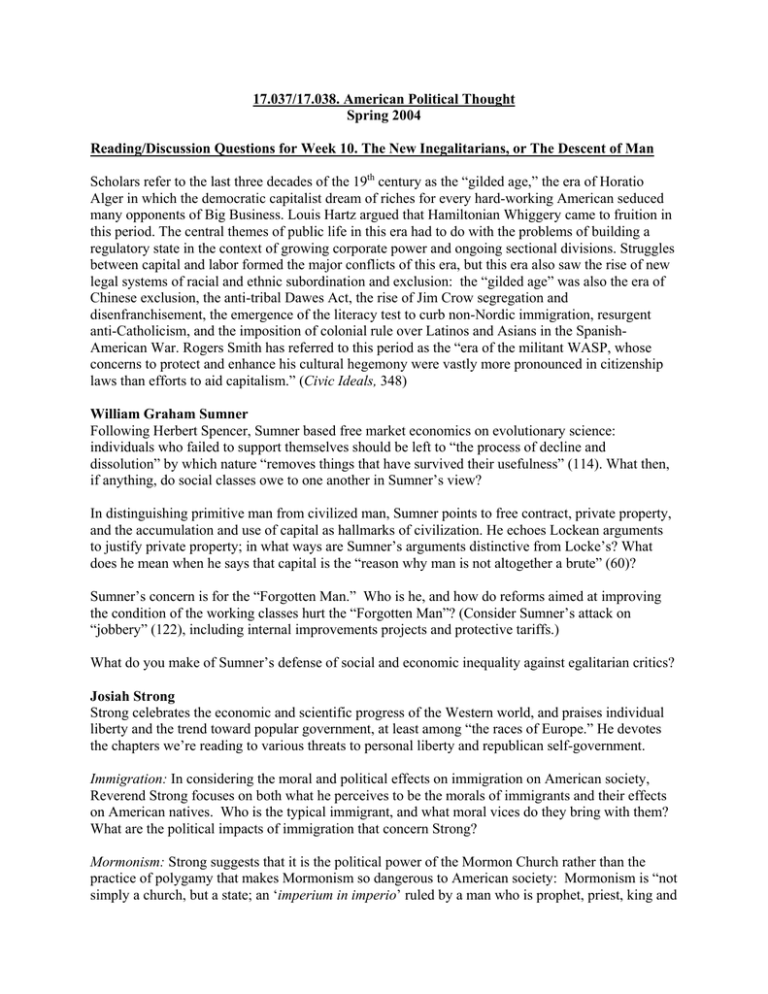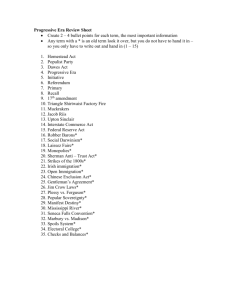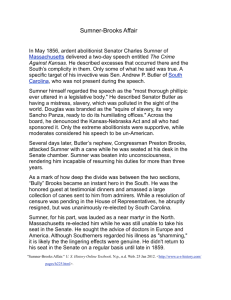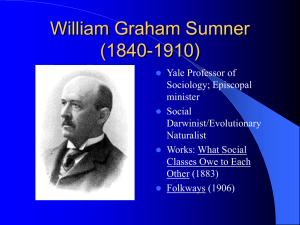17.037/17.038. American Political Thought Spring 2004
advertisement

17.037/17.038. American Political Thought Spring 2004 Reading/Discussion Questions for Week 10. The New Inegalitarians, or The Descent of Man Scholars refer to the last three decades of the 19th century as the “gilded age,” the era of Horatio Alger in which the democratic capitalist dream of riches for every hard-working American seduced many opponents of Big Business. Louis Hartz argued that Hamiltonian Whiggery came to fruition in this period. The central themes of public life in this era had to do with the problems of building a regulatory state in the context of growing corporate power and ongoing sectional divisions. Struggles between capital and labor formed the major conflicts of this era, but this era also saw the rise of new legal systems of racial and ethnic subordination and exclusion: the “gilded age” was also the era of Chinese exclusion, the anti-tribal Dawes Act, the rise of Jim Crow segregation and disenfranchisement, the emergence of the literacy test to curb non-Nordic immigration, resurgent anti-Catholicism, and the imposition of colonial rule over Latinos and Asians in the SpanishAmerican War. Rogers Smith has referred to this period as the “era of the militant WASP, whose concerns to protect and enhance his cultural hegemony were vastly more pronounced in citizenship laws than efforts to aid capitalism.” (Civic Ideals, 348) William Graham Sumner Following Herbert Spencer, Sumner based free market economics on evolutionary science: individuals who failed to support themselves should be left to “the process of decline and dissolution” by which nature “removes things that have survived their usefulness” (114). What then, if anything, do social classes owe to one another in Sumner’s view? In distinguishing primitive man from civilized man, Sumner points to free contract, private property, and the accumulation and use of capital as hallmarks of civilization. He echoes Lockean arguments to justify private property; in what ways are Sumner’s arguments distinctive from Locke’s? What does he mean when he says that capital is the “reason why man is not altogether a brute” (60)? Sumner’s concern is for the “Forgotten Man.” Who is he, and how do reforms aimed at improving the condition of the working classes hurt the “Forgotten Man”? (Consider Sumner’s attack on “jobbery” (122), including internal improvements projects and protective tariffs.) What do you make of Sumner’s defense of social and economic inequality against egalitarian critics? Josiah Strong Strong celebrates the economic and scientific progress of the Western world, and praises individual liberty and the trend toward popular government, at least among “the races of Europe.” He devotes the chapters we’re reading to various threats to personal liberty and republican self-government. Immigration: In considering the moral and political effects on immigration on American society, Reverend Strong focuses on both what he perceives to be the morals of immigrants and their effects on American natives. Who is the typical immigrant, and what moral vices do they bring with them? What are the political impacts of immigration that concern Strong? Mormonism: Strong suggests that it is the political power of the Mormon Church rather than the practice of polygamy that makes Mormonism so dangerous to American society: Mormonism is “not simply a church, but a state; an ‘imperium in imperio’ ruled by a man who is prophet, priest, king and pope, all in one” and as a result, antithetical to republican government (113). What remedies does he suggest for addressing the dangers of the “ecclesiastical despotism” that is Mormonism? Socialism: Strong observes socialism becoming increasingly attractive to certain classes of men in his day and points to the following conditions favorable to the growth of socialism: immigration, excessive individualism, irreligion, the growth and entrenchment of social inequality, and the discontent of workers. How do each of these factors encourage socialism? Strong seems somewhat sympathetic to socialism; he indicated that the more moderate Socialist Labor Party advocated “much that is reasonable” (140), given what he saw as the tendency of “our present industrial system” to “separate classes more widely, and to render them hereditary,” conditions that were “unrepublican and dangerous” (146). One scholar has labeled Strong a “reform Darwinist”—that is, someone who accepts evolution but is hopeful that human intelligence could guide society to more widely beneficial results than those produced by the “industrial system.” Do you agree based on your reading of Strong? Henry Grady Atlanta Constitution editor Henry Grady was among the Southern leaders who called on Northerners to permit the New South to settle its race problem through pacifying and tutelary systems of segregation and disfranchisement. Beginning around 1890 and peaking around 1900, Southern and border states legally codified various forms of Jim Crow segregation, disfranchising mechanisms, and practices excluding blacks from juries. What is the problem, in Grady’s view, with blacks having the right to vote? Grady asks for Northerners’ patience and non-interference in dealing with the race problem in the South. What then, in his view, will guard against the subordination of blacks? In concluding his speech, to what does Grady appeal to unite Northerners and Southerners? Congressional Record—Senate on Immigration Restriction and Woman’s Suffrage Congressional Record—Senate, February 28, 1882: Chinese Exclusion Senator John Miller of California combined economic and racial claims to argue for closing off Chinese immigration. What is the content of these claims, and do they have any merit? Congressional Record—Senate, January 25, 1887: Woman’s Suffrage In presenting his arguments for denying women the right to vote, Senator Brown appealed to God, nature, and the dangers of enfranchising a large class of “grossly ignorant” people. How did he elaborate these claims? Senator Dolph disagreed; what arguments did he offer in support of woman’s suffrage? Congressional Record—Senate, March 16, 1896: Literacy Test Senator Henry Cabot Lodge proposed a literacy test as a way to restrict immigration. Lodge acknowledged that the true aim of his literacy test was to weed out “inferior” races, including “Russians, Hungarians, Poles, Bohemians, Italians, Greeks, and…Asiatics” (2819). According to Lodge, upon what factors are racial differences based, and why is the “English-speaking race” superior to the rest? How did the inferior races threaten “the quality of our race and citizenship”?





